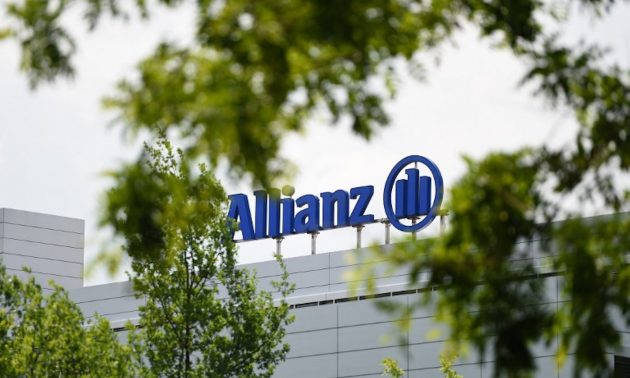
The Wall Street Journal reports: "In its latest move to show it's open for foreign businesses ahead of a summit with President Trump and other Western leaders, China paved a way for German insurer Allianz SE. With a meeting of the Group of 20 major economies opening Friday, the monthslong trade battle with the U.S. and rising criticism of China's trade practices from Europe are putting pressure on Chinese President Xi Jinping. In recent weeks, Chinese regulators permitted American Express Co. to set up card-clearing services and blessed United Technologies Corp.'s $23 billion takeover of airplane-parts maker Rockwell Collins Inc. The insurance and banking regulator said Sunday that it received Allianz's request to establish what the regulator said would be the country's first wholly foreign-owned insurance holding company. Allianz said the approval will allow it to expand investment in China. An insurance holding company signals broad access to China's insurance market, compared with a wholly owned entity in either life insurance or property and casualty insurance. Hong Kong-based AIA Group, which spun out of AIG, is the only foreign company operating without a local partner in China's life-insurance market, and is limited to operating in only some cities."
Forbes reports: "Move over, U.S. economy: The real action in global forecasting these days lies in figuring out what is happening in the world's second largest economic powerhouse, China. Wall Street is increasingly worried about slowing growth in foreign economies despite strong economic numbers at home. Federal Reserve Chairman Jerome Powell, too, recently identified weakening overseas economies as a major risk to the U.S. outlook. And these days, when investors say overseas, they really just mean China. After all, other emerging economies are viewed as too small individually for potential domestic crises to have large international spillovers. China, on the other hand, could shape the financial fate of nations around the world, both because of its size and increased level of integration into the world economy. Peter Donisanu, investment strategy analyst at the Wells Fargo Investment Institute, offers the following basic but poignant chart highlighting just how sharply China's economic growth pace has slowed in recent years, even if the current official estimates of 6.5% growth (whose accuracy is very much doubted by outside economists) are still robust for global standards."
The New York Times reports: "Some of the most critical work in advancing China's technology goals takes place in a former cement factory in the middle of the country's heartland, far from the aspiring Silicon Valleys of Beijing and Shenzhen. An idled concrete mixer still stands in the middle of the courtyard. Boxes of melamine dinnerware are stacked in a warehouse next door. Inside, Hou Xiameng runs a company that helps artificial intelligence make sense of the world. Two dozen young people go through photos and videos, labeling just about everything they see. That's a car. That's a traffic light. That's bread, that's milk, that's chocolate. That's what it looks like when a person walks. 'I used to think the machines are geniuses,' Ms. Hou, 24, said. 'Now I know we're the reason for their genius.' In China, long the world's factory floor, a new generation of low-wage workers is assembling the foundations of the future. Start-ups in smaller, cheaper cities have sprung up to apply labels to China's huge trove of images and surveillance footage. If China is the Saudi Arabia of data, as one expert says, these businesses are the refineries, turning raw data into the fuel that can power China's A.I. ambitions."
- 2018-11-25 China courts potential allies in trade war with US
- 2018-11-21 Five Takeaways From Our New China Project
- 2018-11-20 China's President Xi Jinping Visits the Philippines to Deepen Ties With the U.S. Ally
- 2018-11-19 APEC fails to reach consensus as US-China divide deepens
- 2018-11-18 China moves closer to allowing foreigners to control insurance ventures: sources
- 2018-11-16 The trade war is pushing business out of China, but not into America
- 2018-11-15 China and the U.S. Offer Rival Visions of the Pacific at the ASEAN Summit
- 2018-11-14 Why Young Pakistanis Are Learning Chinese
- 2018-11-13 Xi Expands China’s Footprint in the Pacific While Trump Stays Home
- 2018-11-12 China calls for open world economy but work remains on landmark trade pact
- The Wall Street Journal China Works to Look Open to Foreign Business as G-20 Summit Nears
- Forbes The Scariest Economic Chart In The World Right Now May Come From China
- The New York Times How Cheap Labor Drives China's A.I. Ambitions
- Business Insider China confirms for the first time that it has a third aircraft carrier in the works
- Huffington Post Scientists in China Claim First Gene-Edited Babies
- The Wall Street Journal It's Official: China's E-Commerce King is a Communist
- Business Insider China is holding a renegade official's family hostage to pressure him to come back
- Forbes AI In China: How Uber Rival Didi Chuxing Uses Machine Learning To Revolutionize Transportation
- Bloomberg China Scientist's Claim on World's First Gene-Edited Babies Sparks Denials
- CNBC China defends its alliance with Pakistan after consulate attack
- Fortune Data Sheet—The Rise and Rise of China's Tech Engine
- CNBC 'Disappointing' share prices abound in China, but venture fund sees possible winners
- Vox China has helped Venom become an $822 million box office success
- CNN In Taiwan, the DPP's loss is China's gain and a setback for the US
- The Diplomat Chinese Scientist Claims to Create World's First Gene-Edited Twins
- The National Interest China's Nuclear Weapons are Going 'Underwater' (And It Might Be a Good Thing)
- Brookings Trade deal or not, the long-range prospects for US-China relations are growing more troubling
- CNBC When Trump and Xi meet, trade is the only bilateral deal they can talk about
- The National Interest What America Can Do to Avoid War in the South China Sea
